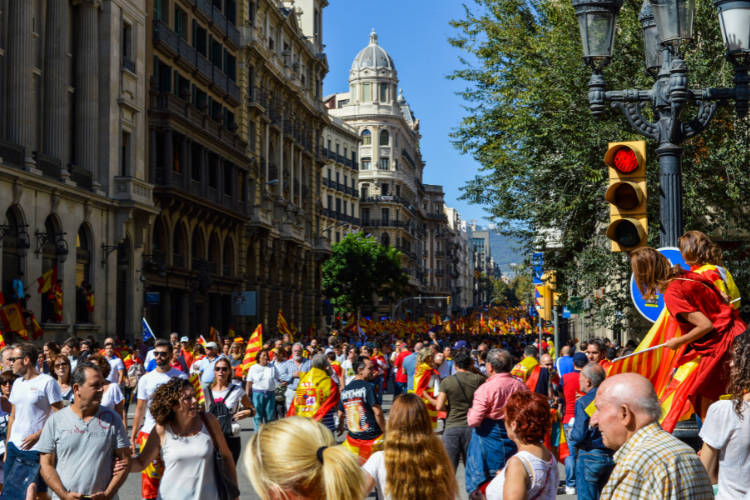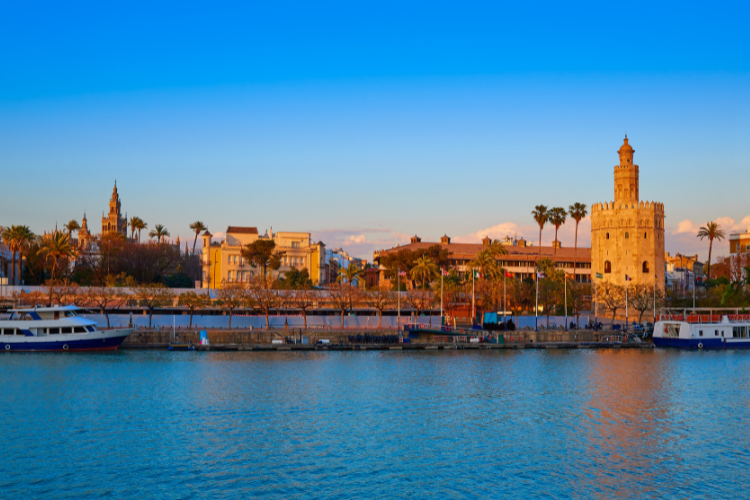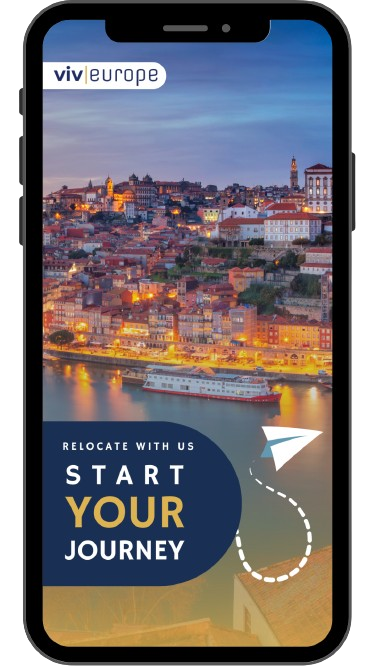Last Updated on November 20, 2023 by Maryam Siddiqui
Portugal is a country of various traditions and many customs well rooted in the country’s culture. The holiday season and Christmas in Portugal are no exception. There’s much to do and explore, especially for expat families and foreigners living here during December.
As a Catholic country, Portugal preserves many Christmas traditions, but you may find some familiar customs in today’s globalized world. Discover what Christmas in Portugal is like, and pick your favorite thing to do! Read till the end to know what expats like you love to do during this festive time.
How is Christmas in Portugal celebrated?
Christmas is a magical time, and Portugal embraces all its residents. Here, from north to south, Christmas traditions revolve around the birth of Jesus Christ.
You’ll experience the nativity scene, the tree decorated in the living room, and a Christmas dinner on December 24th, followed by the exchange of gifts at midnight and, of course, Christmas lunch on the 25th. Above all, Christmas in Portugal is marked by a family reunion and many delicious dishes.
The Nativity Scene
Representing the birth of the baby Jesus and the original meaning of Catholic Christmas, the Christmas nativity scene is one of the oldest traditions in Portugal. Religion in Portugal, as you can see, matters a lot to many residents.
Even before it was a tradition in Portugal to make a Christmas tree, the nativity scene was already present in the celebrations of Portuguese families.
In fact, until the middle of the last century, when the Christmas tree was adopted in Portugal, most families despised it. The crib has always been accepted by the population, especially in the more religious or countryside communities.
Nowadays, the Christmas nativity scene tradition remains strong, especially in the villages of rural Portugal. It is common to see large nativity scenes in the streets and a miniature in the living room in December.
Also, don’t be surprised to see paintings of baby Jesus in Portuguese windows at this time of year.
December 24th: The Christmas Eve and Consoada
In Portugal, Christmas dinner is called Consoada and is celebrated on the night of December 24th, Christmas Eve. This tradition leads families to gather around the dinner table, eating a hearty meal. Many people travel long distances to join their families because it is a family party.
According to Portuguese tradition, Consoada consists mainly of boiled cod with potatoes, eggs, and cabbage. It is served with a hot olive oil sauce with garlic and vinegar served on the side. Delicious!
However, each region of Portugal (and even each family) has its own cod traditions and may serve other dishes.
For example, in the north, Christmas dinner often consists of cooked octopus. In the Algarve, some people eat seafood. And across the country, it’s also common to have a turkey or rooster on the Christmas table.
But whatever the main dish on your Christmas table, the important thing is to be with the family.
The King Cake and the typical Christmas sweets
Portuguese cuisine is abundant in Christmas sweets, which can leave anyone salivating. For Portuguese, much of the spirit of Christmas is in the sweets; the smell of cinnamon, sugar, and caramel in the air invading every corner of the house is a part of what makes Christmas so special. Maybe all the good food in Portugal is what makes the country have such a high quality of life.
Did you know that some of the most Catholic Portuguese families still fast during the day of December 24th until dinner time? No wonder supper is so plentiful! Now, discover Christmas Eve sweets at a table in Portugal:
Bolo Rei
The most traditional Christmas sweet in Portugal is, without a doubt, the Bolo Rei. This sweet cake/bread is a delicious addition to this holiday. It’s essentially a colorful sweet bread filled with raisins and dried crystallized fruit.
It’s called Bolo Rei (the king’s cake), and in the past, people used to hide a small metal egg inside the cake. However found it while eating, would be called the king, and be blessed with good luck. The king cake is a must for Christmas in Portugal.
French toast
French toast, also called “golden slices”, is one of the most traditional sweets of Christmas. With regular milk, condensed milk, or Port. There are several variations, but regardless, French toast cannot be missed at a Christmas dinner table.
Aletria
Much like Arroz Doce, or rice pudding, Aletria is basically Vermicelli pasta covered with pudding and cinnamon. Don’t underestimate it, though; it’s a delicious dessert and perfect for those who prefer less-sweet sweets. Also, one of the only Christmas sweets that aren’t covered with sugar.
Sonhos, Filhoses, and Bilharacos
These traditional Portuguese sweets delight anyone. Be prepared to eat fried and sprinkled dough balls with cinnamon and sugar. Depending on the region you’re in, it can be with only flour or also carrot or pumpkin. It’s enough to please everyone!
Coscorões
This is a traditional Christmas fritter, but unlike most Christmas sweets, the Coscorão tends to be soaked in syrup or slightly sugared, which is always an interesting alternative to other sweets.
December 25th at midnight: mass and gifts
Still following Christian traditions, Christmas in Portugal is also marked by the rooster’s mass on December 24th at midnight. The tradition was that the Christmas dinner only took place after families went to churches to celebrate the mass of Jesus’ birth.
But nowadays, although it is still possible to find churches celebrating this mass on the 24th at night, the tradition has disassembled.
However, the midnight mark of December 25th is what still officially represents the beginning of Christmas. Once everyone has finished feasting and is tired of attacking the sweets, it’s time to celebrate Christmas!
From midnight onwards, families can distribute gifts under the Christmas tree, next to the nativity scene.
Of course, traditions can vary between families and are constantly evolving. But the essence of Portuguese Christmas is being with the family and having a good time. In fact, this is one of the best times to witness the Portuguese way of life.
Christmas Lunch
Usually, at lunch, one eats fantastic Roupas Velhas, or old clothes, which is a typical Christmas dish made with the leftovers of the Christmas Eve dinner, usually well drizzled with sauteed olive oil with garlic.
It can also be just an entrance and then a turkey or lamb baked in the oven, depending on the region of the country.
Since you always make more food than you can eat on Christmas Eve, there’s enough for Christmas Day lunch.
Christmas Lights
A new tradition in Portugal, but one that residents increasingly love, is Christmas lights. All Portuguese cities strive to decorate their main streets at the coldest time of year with lighted trees, gifts, Santa Claus, and even fake snow and red-nosed reindeer.
The streets of the Portuguese capital are, as expected, the ones that are most dedicated to Christmas decorations. Those who live in Lisbon can take the opportunity to stroll among tourists at Christmas fairs, go to concerts and choirs, and even venture onto the artificial skating rink at Praça do Comércio.
Christmas Festivals across Portugal
At Christmas time, several villages come together to make Christmas a big party. This is the case with the Christmas festivals in Perlim, Vila Natal Óbidos, Cabeça Aldeia Natal, and Wonderland Lisboa.
Óbidos Vila Natal
In one of the best-preserved and most beautiful medieval villages in Portugal, the Óbidos Christmas fair is held annually. The town of Óbidos and its ancient walls are filled with tourists and residents to celebrate Christmas in costume, with music, food, and games for all ages.
In December, this is the space for fun and fantasy. A good option for those who want to know the center of Portugal, close to the city of Caldas da Rainha.
Cabeça, a Aldeia Natal
As well as other famous Christmas festivals in the country, Cabeça Aldeia Natal happens almost every year. The small village of Cabeça, 20 km from Serra da Estrela in central north Portugal, is known for taking the Christmas festivities seriously.
Here, locals come together to celebrate the birth of Christ with 100% natural and sustainable decorations. There is no shortage of attractions and food, and a trip to the village in winter in Portugal can even mean snow. It’s worth it, isn’t it?
Perlim
35 km south of Porto, in the city of Santa Maria da Feira, is the Perlim Christmas Park. It is located close to the city’s medieval castle, and every year it attracts thousands of families to enjoy the attractions and Christmas shows.
Daily tickets don’t exceed €8, and it’s a fun experience for this time of the year.
Wonderland Lisboa
In Eduardo VII Park, at the end of the year, the Wonderland Christmas Market happens, which is completely free. It is a charming place for the whole family, full of fun for children and many attractions. There is also a fair with typical handicrafts, sweets, and typical Christmas drinks. Perfect for Lisboners.
What do expats like to do during Christmas in Portugal?
It’s common for expats to feel homesick during the holidays, especially during Christmas, which brings loved ones together. However, expats still manage to make the most out of this long-awaited festival by bringing in their own cultural traditions and incorporating a few new traditions from their own country as well.
Nonetheless, you’re still pretty lucky if you’re spending Christmas in Portugal! If you are an expat spending your first Christmas here, we’ve got you covered.
To feel at home, many expats continue their traditions and commence the holiday festivities by decorating the Christmas tree using delicate, glistening ornaments. Children hang up their stockings above the chimney for Santa. Expats also tend to visit the Portuguese Christmas markets to enjoy the chilly breezes and essence of the occasion.
Expat families also like to consolidate the Portuguese traditions in their lifestyle when living in Portugal. Christmas bonfires, or Madeiros, are one of the homiest traditions expats enjoy here.
In areas like Castelo Branco, you may frequently come across these bonfires in parking lots of churches. You get to meet other locals and foreigners, mingle around, indulge in delicious food, and share holiday greetings.
Moreover, opening up presents you have received ranks on top of the most exciting thing about Christmas for many. Many expats also go to the ice rink to ice skate and delve into the festive occasion. While others rent a hotel in the Algarve or Madeira region to enjoy the beautiful beaches and scenery hosted in these localities.
- Connect to other expats living here! Join our Facebook Group – All About Portugal For Expats; make new friends, ask questions, and find more activities to do!
Are you ready for Christmas in Portugal?
Does hearing all this make you want to spend Christmas in Portugal? What traditions did you already know? And what sweets will you definitely want to try?
I hope you enjoyed discovering some of these parties that are so important for families in Portugal and some traditions that are happening every year around here.
It’s not easy to spend Christmas away from your home country. We here at Viv Europe are also expats in Portugal, and even if the Portuguese make us feel at home, it’s not a bad idea to also celebrate the traditions of our own countries. Why not unite cultures? This will definitely help you and your family to adapt better to Portugal.
In any case, with cod or turkey for Christmas, enjoy the holiday to be with the one you love. Happy Holidays, Merry Christmas, and Happy New Year!








